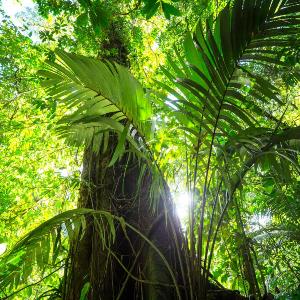Rethinking resilience
17 Mar 2021
“Um(Welt)Denken”: The Elitenetzwerk Bayern is funding a collaborative International Doctoral Program developed by the Rachel Carson Center at LMU and Augsburg University.
17 Mar 2021
“Um(Welt)Denken”: The Elitenetzwerk Bayern is funding a collaborative International Doctoral Program developed by the Rachel Carson Center at LMU and Augsburg University.

Rainforest in Costa Rica | © Galyna Andrushko/Imago
Climate change, biodiversity loss and ocean pollution are among the many systemic factors that are degrading Earth’s environments. The limits of our planet’s resilience have long been exceeded. It is imperative that the environmentally deleterious transformations which humans have set in motion be analyzed in detail, with a view to develop sustainable strategies to halt and possibly even reverse these trends. Demands for a radical reassessment of our relationship with the natural world are becoming louder, and they include calls for more critical awareness of economic conflicts and the role of social hierarchies, which are accelerating the pace of exploitation of the global South. These are highly complex issues, and both the Humanities and the Social Sciences can contribute new insights and perspectives on how they can best be tackled and resolved.
The new International Doctoral Program “Rethinking Environment” is a collaborative venture between the Environmental Science Center (Wissenschaftszentrum Umwelt, WZU) at Augsburg University and the Rachel Carson Center for Environment and Society (RCC) at LMU, two established and respected research institutions in the Environmental Humanities. The Program, whose German title is “Um(Welt)Denken – die ökologische Transformation der Gesellschaft”, is financed by the Elitenetzwerk Bayern.
Beginning in October 2021, 20 doctoral candidates will embark on research projects on questions relating to aspects of the necessary ecological transformation. The graduate students will be supervised by teams of three academics, with each team representing both partner institutions and different specialties. The disciplines involved range from Anthropology, Geography, History and Economics to Environmental Ethics, Environmental Health Sciences, Environmental Philosophy and Theology.
The teaching staff is made up of 20 scientists and scholars from both partner universities. In addition, Visiting Professors from abroad, as well as external professionals, artists and authors who are well versed in environmental issues will also contribute to the program. The graduate students will carry out their research projects collaboratively, aided by the expertise and networks built up by the partner universities. They will participate in the kind of inter- and transdisciplinary forms of research that will be required to provide practical solutions to our urgent environmental dilemmas.
Further information on the Program and how to apply for admission is available on the RCC website.